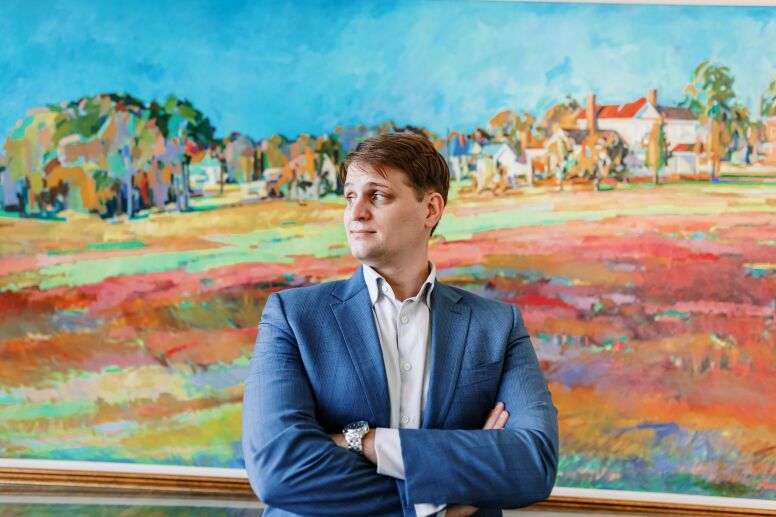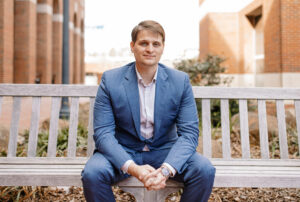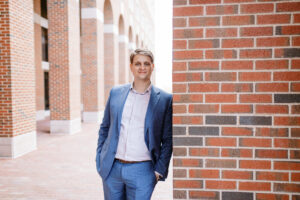News & Stories
Accounting for issues of taxation and innovation

In the early 2000s, accounting professor Stephen Glaeser’s tuition fees came out of his poker winnings during the boom years for no-limit Texas Hold ’em between 2003 and 2006.
He played poker voraciously online during his undergraduate studies in accounting and finance, overcoming time constraints and uncertainty when making high-stakes decisions.
“You have to approach it like a full-time job: I put in 40 hours a week, but you don’t have to play nine-to-five,” says Glaeser, an award-winning researcher who blends academic rigor with fresh practice in his dynamic classes. “But it can be very stressful. You can get a couple of unlucky hands and your week is ruined.”
He parlayed his skills in basic probability and gambling math into enormous poker winnings.
“I used math and statistics to approach each hand with a betting strategy that made sure people couldn’t exploit me,” Glaeser says, citing a game-theory-optimal playing style in which you attempt to perfect your own game so as to become unexploitable to your opponents.
Before arriving in Chapel Hill, the poker star worked at Citi Hedge Fund Services and Huntington National Bank. He went on to earn his MBA from the Fisher College of Business at Ohio State University and his PhD from the Wharton School at the University of Pennsylvania.
He entered the recruitment process at UNC Kenan-Flagler with his wife Chloe Glaeser, an operations professor.
“A lot of academic couples are at two different schools and commute to see one another,” he says. “But we already penciled in UNC as our top choice. We were lucky to both receive offers.”
 He says they were most impressed with UNC Kenan-Flagler’s reputation for research and teaching excellence in their respective fields. “The accounting department has a lot of the top people in the field,” says Glaeser, citing colleagues and coauthors Wayne Landsman, Mark Lang and Eva Labro.
He says they were most impressed with UNC Kenan-Flagler’s reputation for research and teaching excellence in their respective fields. “The accounting department has a lot of the top people in the field,” says Glaeser, citing colleagues and coauthors Wayne Landsman, Mark Lang and Eva Labro.
He was also sold on the spirit of collaboration within the department, which is a core part of the wider UNC Kenan-Flagler’s academic culture.
“They have a no-jerks policy,” Glaeser says. “The School has a really good reputation for not being a political place, where people get along and produce really good research together.”
An award-winning researcher, Glaeser focuses on issues at the intersection of accounting and economics, studying how innovative firms trade-off the benefits of communicating with investors against the costs of public information disclosure.
He’s also interested in how taxation affects business decisions – research that forms the bedrock of teaching excellence inside the business classroom.
His received the 2019 Best Dissertation Award for a paper that explored the effects of proprietary information on corporate disclosure and transparency. The paper was published in the Journal of Accounting and Economics in 2018.
He found that trade secrecy causes equity markets to exhibit asymmetric information — when one party has more information and can make a more informed buying or selling decision, which can cause market issues.
In addition, he found that companies attempt to substitute increased voluntary disclosure of accounting information presented as forecasts for decreased disclosure of information about trade secrets.
But this does not fully offset the potential market-distorting effects of trade secrecy.
 “There is ultimately a price you have to pay; you cannot have your cake and eat it too,” Glaeser says.
“There is ultimately a price you have to pay; you cannot have your cake and eat it too,” Glaeser says.
In other research, the professor explored the effect of patent disclosure on the quality of innovation. He concluded that quality patent documents that are very clear lead to more innovation, as measured by subsequent patents that cite the original.
“Inventors don’t want to give away trade secrets, but the patent system is all about putting knowledge into the public domain so that other inventors are able to learn from that,” says Glaeser. “Ultimately, this leads to more creativity and innovation.”
In 2020, the Journal of Accounting Research and The Accounting Review both named him an outstanding reviewer. Now, he is focused on research with his wife and Labro on how management oversight affects inventor productivity.
He parlays this research into teaching courses in managerial and financial accounting at UNC Kenan-Flagler. His flagship module is “Financial Reporting C” in the Master of Accounting program, which explores the role of human intuition and judgement as automation sweeps through the accounting profession.
“People like to think accounting is just memorizing the rules, but it’s not. A machine can do that better than a person ever could,” Glaeser says. “Accounting is about making judgements and decisions that are tough.”
His classes blend academic theory, rooted in his original research, with a heavy emphasis on its practical application. “Students come to Chapel Hill to work on real accounting problems,” he says. “I put them through simulations to judge ethically grey areas using examples in the news today.”
Classroom time is reserved for this type of experiential learning. Students are expected to study the theory in their own time online — while perhaps juggling a double act as a poker ace.